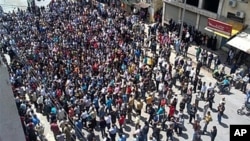The United States said Tuesday repression by Syrian authorities against pro-democracy protests only strengthens the resolve of government opponents. The comments follow an assertion by a Damascus official that President Bashar al-Assad may have ridden out the worst of the crisis facing his government.
The State Department says its own reading of the Syrian situation contradicts the notion that the protest movement is receding, and it says the Assad government cannot escape “eventual accountability” for its violent tactics.
The comments here follow an assertion by a close adviser of President Assad, in a New York Times interview, that the Damascus government has “passed the most dangerous moment” of the ongoing crisis.
The Syrian official, Assad confidante and occasional spokeswoman Bouthaina Shabaan, told a Times reporter allowed into Syria only to interview her that she hopes, as she put it, that “we are witnessing the end of the story” with regard to the popular uprising.
While initially promising reforms, the Assad government has cracked down on protests which erupted in March with increasing ferocity, with Syrian civil rights groups saying at least 630 civilians have been killed and thousands arrested.
At a news briefing, State department Acting Deputy Spokesman Mark Toner said the U.S. embassy in Damascus has a different view from Shabaan about the trend of events in Syria, and he said the violent crackdown only stiffens the resolve of protesters. “What’s apparent from events of past weeks is that the Syrian government’s repression in towns like Der’aa and Banias simply stirs up new violence, and frankly strengthens the resolve of the Syrian people's demands. I would add that false government claims of reforms, such as lifting the emergency law which expanding the number of persons arbitrarily arrested, is also no answer to Syria’ problems," he said.
Toner said accountability for the actions of Syrian officials would come from, among other things, the investigation of Syrian tactics against protestors ordered late last month by the U.N. Human Rights Council.
The United States and key European allies have enacted sanctions against Syrian officials including relatives of President Assad implicated in serious rights abuses.
The Syrian president himself has not been targeted thus far but Toner said the possibility of additional U.S. sanctions remains on the table.
At an event capping a senior-level U.S.-China political dialogue that included U.S. criticism of Chinese human rights practices, Secretary of State Hillary Clinton reaffirmed support for the Middle East democracy movement. “The United States supports the aspirations that the people of the Middle East and North Africa have expressed for more freedom, for more opportunity, for a better future for themselves and their families. And we will continue to support the people of the region as they try to realize those aspirations during this transition period," she said.
Clinton said last week in Rome world powers must show the Syrian government that there are consequences for what she called a "brutal crackdown" on civilians. But she also said a chance remains for the Assad government to live up to its stated commitment to reforms.
US Says Syrian Repression Only Spurs More Unrest




